|
|
|
Sort Order |
|
|
|
Items / Page
|
|
|
|
|
|
|
| Srl | Item |
| 1 |
ID:
128405
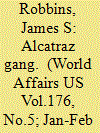

|
|
|
|
|
| Publication |
2014.
|
| Summary/Abstract |
Picture yourself locked "in a dimly lit, windowless concrete box, approximately nine feet long by four feet wide," with a bamboo mat and a bucket, one or both of your ankles locked in irons, left there like a caged animal. Now imagine spending two years there, alone-the isolation interrupted only by routine interrogation and occasional torture sessions, some lasting days-and you are getting close to describing the experiences of a handful of American prisoners of war whose North Vietnamese hosts had designated them as troublemakers. These were the men of Alcatraz. In all, more than three hundred and fifty American servicemen were being held captive by North Vietnam when US involvement ended in 1973. Few tales of American valor are as dramatic and gut-wrenching as those of the Vietnam-era POWs, some of whom were held for eight years, twice the length of US involvement in the Second World War. Defiant, by Alvin Townley, whose previous book chronicled the world of US Navy aviation, is the story of eleven of these captives whose leadership and resistance to their captors' treatment, including efforts to use them for propaganda purposes, caused the North Vietnamese so much trouble they were rounded up, blindfolded, and removed to a special prison they dubbed Alcatraz. They would spend two years there, isolated from the main group of American prisoners, segregated even from one another, forbidden to communicate amongst themselves, and tortured repeatedly for their refusal to capitulate. According to a camp functionary they nicknamed "Rabbit," the Alcatraz Eleven were the "darkest criminals who persist in inciting the other criminals to oppose the Camp Authority." We would call them heroes.
|
|
|
|
|
|
|
|
|
|
|
|
|
|
|
|
| 2 |
ID:
130594
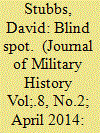

|
|
|
|
|
| Publication |
2014.
|
| Summary/Abstract |
This paper examines why the RAF maintained its view that it would be neither appropriate nor prudent to protect its bombers with long-range fighter escort until the time, late in the day, when the U.S. Army Air Forces' trials to increase the Spitfire fighter's range proved otherwise. The paper argues that some senior RAF officers, who believed that long-range fighters were unnecessary, lacked the conceptual dexterity needed after the RAF's bombers' vulnerability to single-engined fighters became apparent, and that these failings were hidden by a culture of obedience to perceived wisdom that existed within the RAF.
|
|
|
|
|
|
|
|
|
|
|
|
|
|
|
|
| 3 |
ID:
124847
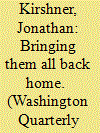

|
|
|
|
|
| Publication |
2013.
|
| Summary/Abstract |
A generally underappreciated shift in U.S. engagement with the global macroeconomic order, accelerated by the global financial crisis, has complicated managing the dollar as a global currency and placed new, politically unfamiliar constraints on U.S. power.
|
|
|
|
|
|
|
|
|
|
|
|
|
|
|
|
| 4 |
ID:
126638
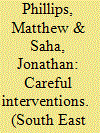

|
|
|
|
|
| Publication |
2013.
|
| Summary/Abstract |
When Ian Brown first visited Thailand in the 1970s, it was a deeply fragmented place. The Vietnam War was raging and US Army personnel dominated downtown Bangkok. In the country's universities, leftists of varying degrees of radicalization fought ideological battles against a conservative military and business elite. Extrajudicial violence was commonplace, and intrigue about the true extent of Communist subversion in the country reigned. It was the height of the Cold War, and there was a palpable sense that ideological forces should be used to determine both the country's future and a correct interpretation of the past.1 So it is notable that Ian's early work not only managed to remain aloof from the political cauldron in which it was written, but that it was so clearly opposed to the historical determinism that was such a prevalent feature of the time
|
|
|
|
|
|
|
|
|
|
|
|
|
|
|
|
| 5 |
ID:
128130
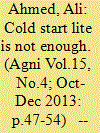

|
|
|
|
|
| Publication |
2013.
|
| Summary/Abstract |
In the wake of the Kargil War, India developed a limited war doctrine. The key elements of this doctrine are that is a proactive and offensive. It is proactive in the sense that while being strategically reactive, for instance to terror provocation emanating from Pakistan, it is proactive at the operational level in choosing the time and place of conventional response and shaping of the battle. It is offensive in terms of its intent of taking the battle to the enemy, fighting on and making gains on enemy territory and its aim plus of punishing the Pakistan military.
|
|
|
|
|
|
|
|
|
|
|
|
|
|
|
|
| 6 |
ID:
129465
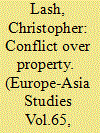

|
|
|
|
|
| Publication |
2013.
|
| Summary/Abstract |
This article examines housing conflicts during times of displacement in World War II and its aftermath. It looks specifically at the property experiences of eastern Poles in the western Polish town of Zielona Góra after forced displacement from the Soviet Union. It explores the intricate relationship between property and population displacement. By examining a micro-historical process at a time when property relations were in flux, we can investigate how displaced people negotiated spaces for themselves within a complicated set of realities. The article also adds to work done on state-society relationships in immediate post-World War II Poland.
|
|
|
|
|
|
|
|
|
|
|
|
|
|
|
|
| 7 |
ID:
124635
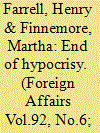

|
|
|
|
|
| Publication |
2013.
|
| Summary/Abstract |
The U.S. government seems outraged that people are leaking classified materials about its less attractive behavior. It certainly acts that way: three years ago, after Chelsea Manning, an army private then known as Bradley Manning, turned over hundreds of thousands of classified cables to the anti-secrecy group WikiLeaks, U.S. authorities imprisoned the soldier under conditions that the UN special rapporteur on torture deemed cruel and inhumane. The Senate's top Republican, Mitch McConnell, appearing on Meet the Press shortly thereafter, called WikiLeaks' founder, Julian Assange, "a high-tech terrorist."
|
|
|
|
|
|
|
|
|
|
|
|
|
|
|
|
| 8 |
ID:
125139
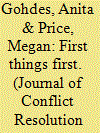

|
|
|
|
|
| Publication |
2013.
|
| Summary/Abstract |
We address weaknesses in the Peace Research Insitute Oslo (PRIO) Battle Deaths Dataset, and as a result draw contradicting conclusions to those presented by Lacina and Gleditsch. Our analysis focuses on the availability of data on battle deaths within specific conflict-years and problems encountered when data from multiple types of sources are combined. We repeat Lacina, Gleditsch, and Russett's analysis of battle deaths over time, with an attempt to provide a more robust model and incorporate an estimate of the uncertainty present in the PRIO Battle Deaths Dataset. This reanalysis reveals that the data used to establish the PRIO Battle Deaths Dataset does not offer a clear answer as to whether battle deaths have decreased or increased since the end of the Second World War. We contend that while the PRIO Battle Deaths Dataset offers the most comprehensive assembly of battle deaths data available to date, it is not suitable for analysis across countries or over time.
|
|
|
|
|
|
|
|
|
|
|
|
|
|
|
|
| 9 |
ID:
124341


|
|
|
|
|
| Publication |
2013.
|
| Summary/Abstract |
At the beginning of the Soviet-German war in June 1941 most Anglo-American Government officials believed in a swift collapse of Soviet resistance. When the collapse did not materialize assessments gradually changed and a more realistic outlook on Soviet war potential was eventually produced. But it was not until the late summer of 1943 that the Anglo-Americans finally believed in a more sustained Red Army offensive effort against the Germans, and even then US observers still underestimated Soviet strength. During the whole period 1941-1943 British observers generally had a relatively more realistic apprehension of Soviet capabilities. The Anglo-American perceptions and the change in perceptions, considering the whole context of World War II, had implications for the Western Allied war effort.
|
|
|
|
|
|
|
|
|
|
|
|
|
|
|
|
| 10 |
ID:
124789
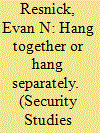

|
|
|
|
|
| Publication |
2013.
|
| Summary/Abstract |
Neorealist and liberal theories advance discrepant explanations for variations in wartime alliance cohesion. Neorealism claims that variations in cohesion are attributable to shifting international systemic conditions; liberalism argues that such differences are a function of the regime type(s) of the various alliance partners. I advance a synthetic neoclassical realist theory that proposes a given ally's decision to minimize or maximize cohesion is a function of both international systemic conditions and the regime type of the state in question. I test the three theories in US, British, and Soviet alliance decision making during World War II and find that neoclassical realism alone accounts for the behavior of all three partners over the lifespan of the "Grand Alliance" (January 1942-September 1945). The article concludes by discussing the implications of these findings for the study and practice of alliance politics, as well as for contemporary US foreign policy
|
|
|
|
|
|
|
|
|
|
|
|
|
|
|
|
| 11 |
ID:
130792
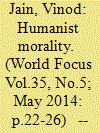

|
|
|
|
|
| Publication |
2014.
|
| Summary/Abstract |
Earlier the world as a whole was a conflict -zone. People living in a particular region had norms and morality which served them well. But that morality was at the cost of people living in other regions because of conflicts between them. So, that morality involved inhumanity towards those living outside their regions. Now due to growth of science, industry and technology, the world seems to be coming closer to all; the unfamiliarity that prevailed earlier between people of different regions is diminishing and familiarity is growing. People around the globe are becoming aware of this. innumerable institutions that are taking shape are spreading the awareness about the inadequacy of old thinking, ideas and morals. Take Europe for instance. Different regions or countries of Europe were indulging in prolonged wars with each other. This, after the Second World War, changed. They realized the futility of it all, and established various institutions like the European Union. Thus reducing and extinguishing the con?icts between them, leading thereby not only to a prolonged period of peace but to unheard of prosperity.
|
|
|
|
|
|
|
|
|
|
|
|
|
|
|
|
| 12 |
ID:
124255
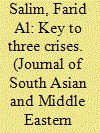

|
|
|
|
|
| Publication |
2013.
|
| Summary/Abstract |
Palestine occupied an exceptional place in German strategic thinking long before Hitler's rise to power, indeed before his birth. Ashkenazi Jews from Germany and Poland established a small religious community in Jerusalem around 1800. They lived in abject poverty, supported by contributions from fellow Jews in Europe, and devoted all of their time to religious study.
|
|
|
|
|
|
|
|
|
|
|
|
|
|
|
|
| 13 |
ID:
128846
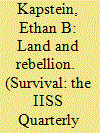

|
|
|
|
|
| Publication |
2014.
|
| Summary/Abstract |
A study of land reform illuminates the paradox of economic instruments in counter-insurgency. Where redistributive demands are at the core of a rebellion, foreign powers will find it difficult to respond effectively. Recent years have seen the United States and its allies embroiled in major counter-insurgency campaigns in Afghanistan and Iraq, and lesser operations in such countries as Yemen and Somalia. These battles against local insurgencies are only the latest in a string of such conflicts that have erupted in nearly every developing region since the end of the Second World War. Sharply debated at home and abroad, they raise the fundamental question of what the counter-insurgents can reasonably hope to achieve in violent settings, even when they deploy an array of military, political and economic instruments. What are the 'moving parts' that foreign powers can manipulate in their efforts to force or encourage violence-reducing reforms in these societies?
|
|
|
|
|
|
|
|
|
|
|
|
|
|
|
|
| 14 |
ID:
124284
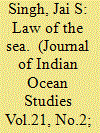

|
|
|
|
|
| Publication |
2013.
|
| Summary/Abstract |
History of the law of the sea is to a large extent the story of the development of freedom of the seas doctorine and the vicissitudes through wgich has it has passed through the centuries. For the last nearly 200 years, it has been accepted as an undisputed priciples, almost a dogma, which no one could dare challanges.
|
|
|
|
|
|
|
|
|
|
|
|
|
|
|
|
| 15 |
ID:
132014
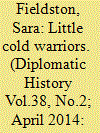

|
|
|
|
|
| Publication |
2014.
|
| Summary/Abstract |
During the two decades following World War II, American voluntary agencies including Christian Children's Fund, Foster Parents' Plan, and the Save the Children Federation ran child sponsorship programs that allowed American' foster parents' to send funds and exchange letters with youngsters in war-torn and poverty-stricken countries around the world. These programs were at once humanitarian gestures and political projects. American sponsorship agencies sought to forge international friendships that would support the United States' political alliances and mold children into strong democratic citizens who would join the fight against communism. Enlisting familial ideals in the service of U.S. foreign policy, American child sponsorship agencies rendered love itself a powerful Cold War weapon.
|
|
|
|
|
|
|
|
|
|
|
|
|
|
|
|
| 16 |
ID:
125189
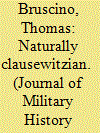

|
|
|
|
|
| Publication |
2013.
|
| Summary/Abstract |
American military theorists between the Civil War and World War II have garnered limited attention in military history, but they developed many ideas about the nature and practice of war. These theorists did not fixate on the writings of Carl von Clausewitz, but they were familiar with his work. But independent of Clausewitz, American military theory emphasized the Clausewitzian concept of the relationships among politics and society in preparing for and fighting wars. This article explores Clausewitz and American military theory, explains how Americans became naturally Clausewitzian, and discusses what their thinking has to do with the conduct of war.
|
|
|
|
|
|
|
|
|
|
|
|
|
|
|
|
| 17 |
ID:
128226
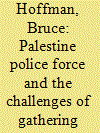

|
|
|
|
|
| Publication |
2013.
|
| Summary/Abstract |
This article assesses the performance of the Palestine Police Force (PPF) in countering the Jewish underground organizations that challenged British rule over Palestine after World War II. It argues that four reasons account for the PPF's inability to contain the terrorist threat: the chronic manpower shortages that ultimately compromised its effectiveness and required the military's intervention; the progressive militarization of the PPF that undermined its ability to discharge traditional police functions; its desperate deployment of elite, special counterterrorist units; and its problematical collection and analysis of intelligence. The article concludes that these weaknesses inevitably led to a situation where the maintenance of law and order was impossible and British rule was rendered untenable.
|
|
|
|
|
|
|
|
|
|
|
|
|
|
|
|
| 18 |
ID:
124294
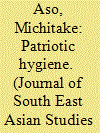

|
|
|
|
|
| Publication |
2013.
|
| Summary/Abstract |
This article examines knowledge production about malaria in colonial and postcolonial Vietnam. During the 1920s and 1930s, medical doctors cooperated with plantation managers in order to develop industrial hygiene techniques consisting of environmental modification and quinine use. By the 1930s, changing motivations, in particular racial hygiene and patriotism, drove malaria control efforts. The wartime pressures to control malaria between the 1940s and 1975 further encouraged patriotic hygiene. This history of malaria science in Vietnam highlights the tension between change and continuity and shows the importance of place in the conjunction of scientific knowledge production and nation-building projects.
|
|
|
|
|
|
|
|
|
|
|
|
|
|
|
|
| 19 |
ID:
128255
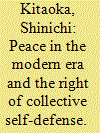

|
|
|
|
|
| Publication |
2013.
|
| Summary/Abstract |
The argument for constitutional revision has been ongoing in the post-war era but until now no action has been taken. The focal point in the discussion has been Article 9. This article argues that Japan's peace posture has not been guaranteed by Article 9. The article then turns to the right of collective defense and whether reinterpretation of Article 9 language is required in the current security environment. The conclusion calls for active and specific dialogue to resolve this issue in a timely manner.
|
|
|
|
|
|
|
|
|
|
|
|
|
|
|
|
| 20 |
ID:
128850
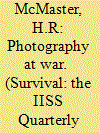

|
|
|
|
|
| Publication |
2014.
|
| Summary/Abstract |
A thematic selection and analysis of war photography across 165 years has tremendous explanatory power about the nature of modern war and the human experience in war and its aftermath. The year 2014 brings centennial commemorations of events that helped make the twentieth century the bloodiest in human history. Among these are the assassination of Archduke Franz Ferdinand on 28 June, Germany's invasion of Belgium and France on 4 August, and the First Battle of the Marne in early September - the battle that halted the German offensive and ushered in an unprecedented period of stalemated, destructive warfare on the Western Front. As historian Margaret MacMillan has observed, the First World War still haunts us not only because of the scale of the carnage and suffering, but because so many believed that the early-1900s version of globalisation and interdependence had rendered war futile. The comparisons to today seem obvious, as the United States and European nations cut military budgets based, in part, on the belief that large-scale armed conflicts are relics from a barbarous past. If, however, peace remains as the Ancient Greek historian Thucydides described it over 2,500 years ago - 'an armistice in a war that is continuously going on' - understanding war and warfare will remain important for preventing conflict, as well as for its effective conduct. Understanding war's human, psychological and social dimensions requires an interdisciplinary approach and study across multiple genres including literature, art, film and photography.
|
|
|
|
|
|
|
|
|
|
|
|
|
|
|
|
|
|
|
|
|